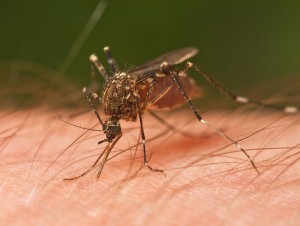In case there was any doubt, the Twin Cities area population remains at risk for West Nile Virus this summer, as disease-carrying mosquitos were discovered earlier this week by Metropolitan Mosquito Control District researchers.
 A sample of mosquitoes collected by the Metropolitan Mosquito Control District (MMCD) in Ramsey County, as part of its annual West Nile virus risk reduction program, has tested positive for the virus this week.
A sample of mosquitoes collected by the Metropolitan Mosquito Control District (MMCD) in Ramsey County, as part of its annual West Nile virus risk reduction program, has tested positive for the virus this week.
The MMCD controls mosquito populations in the seven county metro area. While that doesn’t include Wright County, it does include western Hennepin, just across the Crow River.
So far this summer there have been no human cases of the virus reported in Minnesota. The recent rainfall, however, will result in an increase in the mosquito species responsible for spreading the virus within the bird population. Warm summer temperatures also could accelerate this trend.
“West Nile virus is usually detected in mosquito samples around this time of year, and it will continue to circulate among mosquitoes and birds. Even though the health risk is still low, we should all use common sense measures to avoid mosquito bites,” said Kirk Johnson, MMCD vector ecologist.
MMCD tracks citizens’ reports of dead birds throughout the metro area. Tracking these
reports gives MMCD another tool in the effort to reduce risk of West Nile virus in the
metro area. To report a dead bird, visit: http://www.mmcd.org/mosquito-
According to the MMCD, here’s how you can help reduce your risk for West Nile virus:
■ Check yards and neighborhoods for water-holding containers and recycle or
dump them out (it can take less than a week for mosquitoes to develop in standing
water),
■ Make sure window screens are in good repair
■ Wear long-sleeved, loose-fitting, light-colored clothing
■ Use mosquito repellent (be sure to follow label directions)
■ Whenever possible, avoid prolonged outdoor activity at dawn and dusk when mosquitoes are most active.